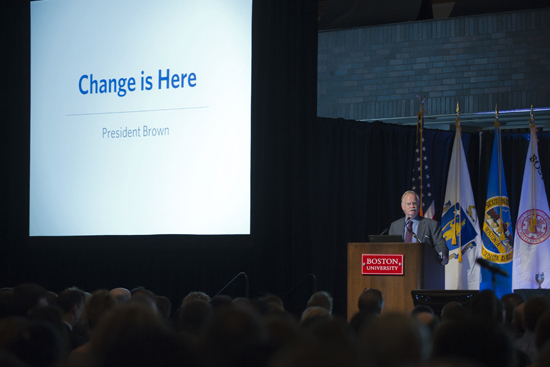At Long Last, BUworks Arrives
University readies to help employees as new computer system launches

As America commemorated its independence, BU declared independence from its Reagan-era administrative software by rolling out phase one of BUworks.
Years in the making, BUworks is a modernization of the University’s finance, budgeting, payroll, procurement, and human resource systems.
Yesterday concluded a six-day rollout of phase one, which marked a number of changes, including the start of hourly employees entering their time in the new system, and of their supervisors approving electronic timesheets.
Anticipating possible start-up glitches and employees’ questions, BUworks has focused its homepage on resources that will help with the new system, including online help.
“This is a major milestone in our effort to modernize the information technology systems of the University and is the result of two years of effort by a dedicated team of hundreds of BU employees” and outside consultants, President Robert A. Brown wrote in a letter emailed to employees last week.
The project has two more phases, scheduled for January 1, 2012, and July 1, 2012.
Among the changes introduced in phase one:
Human Resources. Employees can view and print newly designed pay statements, manage up to four direct deposit bank accounts, and update federal tax withholding information online. Supervisors have an expanded view of their organization and now can review work schedules, view attendance, and process hiring and other actions online.
Finance. Financial managers will be able to view encumbrances against an account. A new chart of accounts enables more precise cost management.
Procurement. Employees who purchase supplies for BU will be able to log on to the BUworks Central portal and select a product for an online catalog, or enter a description to add the item to their shopping cart.
Grants management. Faculty and department administrators will be able to view grant-related reports from both SAP Grants management (SAP is the company supplying the software for BUworks) and the new Kuali Coeus Research Management (KCRM) system, using the reporting tab of the BUworks Central portal. The first phase of KCRM replaces systems formerly used by the Office of Sponsored Programs on both the Charles River and Medical Campuses for award tracking and reporting.
Anticipating questions from employees about the new system, the University has implemented a training program and is publicizing several information sources. “Readiness leaders” and “power users”—designated managers and employees in each school and University department who are trained in the new system and serve as liaisons to BUworks—can help field questions.
“We have 80 readiness leaders and 350-plus power users located across the University,” says Rich Janis, BUworks director of organizational change management. “They each play a very important role in communicating updates and preparing people” for the new system.
In a letter last week to the University community, BUworks leaders mapped out the expected challenges of the system’s inauguration.
“The functions that you perform today (purchasing, hiring, reporting, etc.) are structured differently in SAP,” the software system BU chose to operate its business side, the letter said. “We will all need patience and time to become accustomed to the changes.”
During the next few weeks, employees’ most common problem with the new system will likely be accessing various functions, the letter said. The University has worked to provide access, including security authorization, for thousands of employees; if the system denies access to an employee who was authorized by a readiness leader, that person should contact the IT Help Center. Employees who have not been assigned access to the transactions that they need for their work should contact their readiness leader.
The University tested the system to make sure it could handle the workload of BU’s thousands of employees, the letter said, and will monitor the system for any slowdowns in the coming weeks.
Most hourly employees will enter their time online through the BUworks Employee Self-Service (ESS), which replaces the old Employee Link. The letter urged employees to familiarize themselves with time entry before trying to finish a time sheet in the new system. Under the new system, they must enter and release their time sheets by 5 p.m. each Monday; supervisors must approve sheets no later than 5 p.m. each Tuesday.
BUworks will have consumed six years of planning and implementation by its conclusion next year. The upgrade was necessitated by antiquated systems and practices that could not support growth, Brown has said. Those issues first surfaced in a 2006 study for the University that concluded the old software system would become increasingly obsolete. For example, the University doesn’t have an integrated information system for human resources. Last year, Peter Fiedler, vice president for administrative services, told BU’s annual Management Conference that the University lacked a central repository for its job classification records, and those records were stored variously on paper and in computer documents—all of which make the record-keeping less secure and inefficient.
Consolidating several software systems into the new SAP system will provide easier and more secure access to information for 8,500 employees, while eliminating many paper forms.
“It has taken us 20 years to develop the level of expertise we have with our legacy systems; it will take time to rebuild that level of comfort and understanding with the BUworks system,” Brown wrote. “Your support and patience will be needed as staff and faculty adjust to changes and find solutions to problems. I am confident that we will rise to this challenge together.”
Tomorrow: Where to get help with questions about BUworks.
Rich Barlow can be reached at barlowr@bu.edu.

Comments & Discussion
Boston University moderates comments to facilitate an informed, substantive, civil conversation. Abusive, profane, self-promotional, misleading, incoherent or off-topic comments will be rejected. Moderators are staffed during regular business hours (EST) and can only accept comments written in English. Statistics or facts must include a citation or a link to the citation.